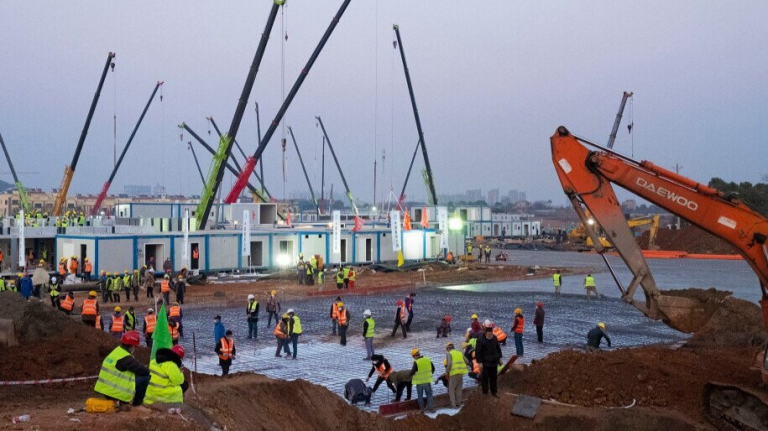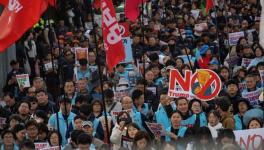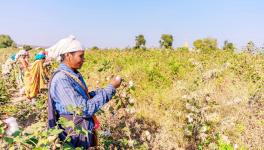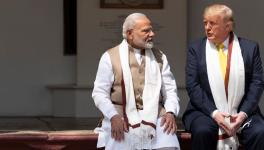Covid-19, China and Invocations to International Law

Dozens of bulldozers were used to help build the hospital in Wuhan in 10 days.
There is a growing clamour in some quarters to foist a legal battle against China over Covid-19. Several voices are arguing for reparations to affected populations across the world for the dangerous Novel Coronavirus that has caused deaths, large-scale hospitalisations and never-seen-before state-induced quarantines. Is the premise to take China to court correct under international law, and more importantly, is it justified to blame China for the ongoing pandemic?
Who caused Coronavirus?
Coronavirus is another instance in the long history of zoonoses—diseases that jump from animals to humans. The domestication of the horse led to the virus responsible for the common cold in humans, while that of chickens introduced chickenpox, shingles, and various bird flu strains. Pigs were the source of influenza, while measles and tuberculosis emerged from cattle. Black plague, the Spanish flu and smallpox are a testimony to this. It is believed that the latest coronavirus has emerged, in sync with this trend, from a Chinese woman in Wuhan who ate bat soup. (Bats may have been the source of this virus, but the viral video that purportedly substantiates the claim was filmed in the South Pacific island of Palau, not China, for the popular online travel show of a Chinese video blogger named Wang Mengyun.) Despite this fake news, many politicians have termed the virus a bioweapon and said that an international judicial investigation will prove it was a conspiracy.
The term “coronavirus” refers to a family of viruses that are shaped like a crown, and they account for about 10% of common colds in humans. Novel Coronaviruses have made the jump into the human population on three occasions in the 21st century, each time causing a deadly pandemic: SARS (severe acute respiratory syndrome) in late 2002, MERS (Middle East respiratory syndrome) in 2012, and Covid-19 (coronavirus disease 2019) at the start of December.
Why blame China?
Since the onset of the pandemic, it was reported that China suppressed information about the virus for a month, and that was enough to infect the world. This messaging has resulted in xenophobia against South Asians everywhere, who are being branded and abused as disease-carriers by online trolls, in memes, caricatures and hate speech.
The International Commission of Jurists and the All-India Bar Association have approached the United Nations Human Rights Council (UNHRC) seeking unspecified sums as reparation for China’s legal liability for allegedly “grave offences against the humanity” under the 'Responsibility Of States For Internationally Wrongful Acts, 2001 and for having violated International Health Regulations (IHR), International Human Rights and as also International Humanitarian Laws and UDHR clauses. The petition seeks the intervention of UNHRC to investigate and direct China to “adequately compensate” member-states, particularly India, for developing a bio-weapon “capable of mass destruction of mankind throughout the world” failing to respect international obligations.
Incidentally, an email complaint to UNHRC was made by Adish C Aggarwala, who happens to be the current president of the London based International Commission of Jurists and chairman of the All India Bar Association and co-author of the 672-page coffee-table book weighing 5 kilograms and titled Narendra Modi: A Charismatic & Visionary Statesman, that was released on the Prime Minister’s 68th birthday in 2018. It is also worth noting that both the PM and his government have been severely criticised from many quarters for how India has managed the epidemic on their watch. Delayed response—the Centre imposed a sudden lockdown at least two months after the world was reeling under the pandemic—and unpreparedness are the most serious criticisms.
Even in the United States, a $20 trillion lawsuit has been filed in April against China which charges it with aiding and abetting death, supporting terrorism, conspiracy to cause injury and the death of US citizens, negligence, wrongful death, assault and battery, and so on—and this is another country whose leaders stand charged with wasting precious time before responding to the creeping march of Coronavirus.
Which forum is suitable to adjudicate?
A case is being made out that China violated Articles 6 and 7 of the International Health Regulations which, among other things, state that public authorities are mandated to notify the World Health Organisation (WHO) about the existence of a disease of public and international concern within 24 hours. It is being argued further on the basis of Article 25(1) of the Universal Declaration of Human Rights (UDHR) that states must refrain from denying or limiting access to healthcare, or from marketing unsafe drugs, from imposing discriminatory practices relating to health status and needs, from limiting, withholding, censoring or misrepresenting health information and from infringing the basic human rights of people recognised under UDHR.
Given the human rights ramifications of health, forum-shopping cannot be ruled out as these and possibly other parties seek avenues to make China a defendant. The International Court of Justice (ICJ), the International Criminal Court (ICC), the European Court of Human Rights (ECHR) and the national courts are the available fora.
As for the UNHRC, it must be pointed out that it is considered a mere fact-finding and discussion forum with no powers to impose sanctions. It is often termed as “toothless”. The UN General Assembly adopted a resolution on 2 April calling for intensified international cooperation to contain, mitigate and defeat the pandemic, including by exchanging information, scientific knowledge and best practices and by applying the relevant guidelines recommended by the World Health Organization. In addition, the UN Security Council is yet to deliberate on the Covid-19 crisis.
Who has the mandate?
Can the WHO take China to the International Court of Justice (ICJ)? The right to health was first described as fundamental in the Alma-Ata Declaration of 1978 at the World Health Assembly. Since the declaration, governments have considered making health a priority as nations have sought to develop their human capital. Yet, importantly, policy-planning matters are strictly considered a state’s prerogative.
Conversely, Article 3 of the International Law Commission’s Draft Articles on Responsibility of International Organisations specifically states that “every internationally wrongful act of an international organisation entails the international responsibility of that organisation.” By this measure, it is the culpability and the accountability of the WHO that has been raised by many after the Covid-19 pandemic: the WHO has been seen as equally responsible for not handling the crisis effectively.
The liability of an international organisation is based on a 1999 ICJ verdict which reflects a rule of international law, as a general principle and as a rule of international customary law. Moreover, the legal personhood of international organisations is now a settled question. Arguably, there is a political underpinning to this legal position; which is that international organisation play a major and significant role at the global level. With their wide range of influence comes their responsibility and accountability for any violation of international norms. To be fair, there is a caveat: in the nuclear weapons case the ICJ has ruled that the WHO has limited competency to deal independently with legal principles that apply in various jurisdictions.
International organisations do not, unlike nation-states, possess a general competence, but are governed by the “principle of speciality”, which is to say, they are invested with powers by the states which create them. The limits of these powers are a function of the common interests they are meant to promote, as defined by those states. The WHO is a “specialised” international agency formed on the basis of the Charter of the United Nations, designed to organise coherent international cooperation, with its role restricted to the field of public health. It cannot encroach on the responsibilities of other parts of the United Nations system. That makes the WHO’s case a confusing proposition. Also, since it faced a backlash over its mismanagement of the Ebola epidemic, it has come under severe criticism.
Now, what if any state were to take China to the ICJ? First, international legal disputes are adjudicated based on states consent to the forum. Even if the ICJ is agreed upon, in the public interest, it might take up the matter under Article 36 (2) which pertains to compulsory jurisdiction on the breach of an international obligation. However, this is rarely ever resorted to. Secondly, China enjoys sovereign immunity and jurisdictional immunity from their acts from being sued—a premise that is fundamental to the enforcement of international law and aptly declared so in the International Law Commission’s Articles on State Responsibility. This is evidenced by ICJ in the 2012 Jurisdictional Immunities case, wherein the court affirmed that national courts are required to determine whether a foreign State is entitled to immunity as a matter of international law before it can hear the merits of the case brought before it and before the facts have been established. Therefore, this immunity may not be absolute, but it is still a first recognised right nonetheless at all forums.
Lara Pair argues that judicial activism in the ICJ can take not only the form of active creation of law but also of (passive) refusal. If the world court refuses, for example, to adjudicate on or review acts of other UN organs, it will be seen as not fulfilling its function; which is to protect the UN Charter fully. The political cost of having matters on the roster that do not get adjudicated can whittle down the legitimacy of a legal forum. Its credibility being the question, the United Nations and the ICJ would be highly unlikely to put such a case on the roster of the court.
China and bioweapons
According to the International Humanitarian Law database on state practice relating to biological weapons, China in 1946 submitted that it considers bacteriological warfare as a war crime and maintains a strict export control policy on biological agents. At the Fourth Review Conference of States Parties to the Biological Weapons Convention in 1996, China stated that it does not develop, produce, stockpile or otherwise acquire or retain biological agents, toxins, weapons, equipment or means of delivery prohibited under Article I of the 1972 Biological Weapons Convention. In 2005, China maintained that it stands for complete prohibition and thorough destruction of biological and chemical weapons and firmly opposes proliferation of such weapons.
This position and unabated commitment by China, which has been repeatedly re-affirmed, has to be seen in juxtaposition with the jurisdictional ambiguity under international law. Litigating with China at international judicial forums is hardly a choice, as the aim of dispute settlement is dispute-avoidance. Since the aim of dispute settlement should be dispute avoidance, other avenues for dialogue should be considered. This is a time for international solidarity to galvanise maximum partnership from all actors to mitigate the ongoing pandemic.
The finest beneficiary in the last month is Nature, which has fully realised the environmental personhood that the law bestows upon it. States have also taken control over the private sector to offset resource limitations—an otherwise difficult scenario in a world where public-private-partnerships were thriving. Does this mean that socialism is an integral part of governance systems around the world? Only time can tell. Until then, scientific breakthroughs, cooperation and mutual assistance will strengthen us to uphold the greater cause of humanity in these trying times.
With the law being silent on tackling many issues related to the pandemic, making China stand before a judicial body, either at a national or international forum, should be obviated. Instead, while ensuring the rule of law is strengthened, concerted efforts are needed by all states to tackle Covid-19 and treat this case as a progressive development of global health law.
The author is assistant professor at St Joseph’s College of Law, Bangalore. The views are personal.
Get the latest reports & analysis with people's perspective on Protests, movements & deep analytical videos, discussions of the current affairs in your Telegram app. Subscribe to NewsClick's Telegram channel & get Real-Time updates on stories, as they get published on our website.
























